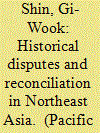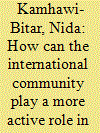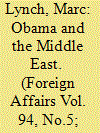| Srl | Item |
| 1 |
ID:
101628


|
|
|
|
|
| Publication |
2010.
|
| Summary/Abstract |
Unhealed wounds from past wrongs, committed during colonialism and war, have created regional animosity and stunted reconciliation in Northeast Asia. Claiming that continued disputes over historical injustice are not solely an intra-Asian issue, this article explores how the US can facilitate historical reconciliation in the region. It is necessary to recognize that the US played a significant role in dealing with historical issues in the aftermath of World War II. Aside from failing to fully address Japanese war crimes in the Tokyo Tribunal, the US was also pivotal in setting the terms of the San Francisco Peace Treaty, a legal instrument that has been the historical precedent for expunging any sense of Japanese guilt and responsibility. Likewise, the US has yet to formally accept its own actions which could be perceived as "crimes against humanity": the US atomic and carpet-bombing of Japanese cities. This article advocates a self-critical, self-reflective approach that would involve US acknowledgement of its own responsibility in handling or mishandling of history issues in Northeast Asia. More specifically, the article also evaluates recent proposals for a presidential visit to Hiroshima or Nagasaki as a means of recognizing the human suffering caused by the atomic bombing, and for a new interpretation of the San Francisco Peace Treaty to better enable victims of Japanese war crimes to air grievances. This article supports both proposals but also argues that they must be implemented with caution and within a larger regional historical framework rather than as an attempt to bolster solely US-Japanese relations.
|
|
|
|
|
|
|
|
|
|
|
|
|
|
|
|
| 2 |
ID:
138327


|
|
|
| 3 |
ID:
140525


|
|
|
|
|
| Summary/Abstract |
Critics of U.S. President Barack Obama’s Middle East strategy often complain that Obama lacks a strategic vision. This is almost exactly wrong. Obama came to office with a conviction that reducing the United States’ massive military and political investment in the Middle East was a vital national security interest in its own right. The occupation of Iraq and the excesses of the war on terrorism had left the United States overextended, especially at a time of economic crisis. “Rightsizing” the United States’ footprint in the region meant not only reducing its material presence but also exercising restraint diplomatically, stepping back and challenging allies to take greater responsibility for their own security. Obama has adhered consistently to this strategy, prioritizing it ruthlessly along the way and firmly resisting efforts to force it off track. This was not a strategy much beloved in Washington or in a region hard-wired for the exercise of American power. But it was a clear and coherent strategy that led Obama to undertake major initiatives on the problems he viewed as rising to the level of core national security interests: Iran’s nuclear weapons program, terrorism, the Israeli-Palestinian conflict, and the war in Iraq.
|
|
|
|
|
|
|
|
|
|
|
|
|
|
|
|
| 4 |
ID:
144406


|
|
|